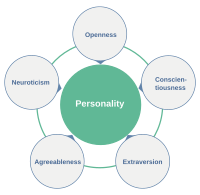
Photo from wikipedia
The present study used a prospective longitudinal design to examine whether willingness to experience negative alcohol-related consequences mediated the effects of personality on consequences (e.g., blacking out, getting into a… Click to show full abstract
The present study used a prospective longitudinal design to examine whether willingness to experience negative alcohol-related consequences mediated the effects of personality on consequences (e.g., blacking out, getting into a fight, and regretted sex). Students (N = 2024) were assessed at three time points: fall semester of the students' first year in college (baseline), 6-months post-baseline, and one-year post-baseline. Personality constructs were assessed at baseline (i.e., impulsivity, sensation seeking, self-regulation), willingness to experience negative alcohol-related consequences was assessed at baseline and 6-months, and negative alcohol-related consequences were examined at baseline and one-year post-baseline. A structural path model was used to examine if willingness mediated the effects of personality on consequences. Baseline drinking was included as a covariate in the model. Results demonstrated willingness to experience consequences significantly mediated the effects of impulsivity, sensation seeking, and self-regulation on consequences. Findings from this study support the idea that consequence-specific cognitions, such as willingness, can explain changes in consequences associated with personality. This suggests that intervention efforts aimed at reducing negative alcohol-related consequences could benefit from the inclusion of consequence-specific cognitions, personality (e.g., impulsivity, sensation seeking, and self-regulation), and drinking.
Journal Title: Addictive behaviors
Year Published: 2019
Link to full text (if available)
Share on Social Media: Sign Up to like & get
recommendations!